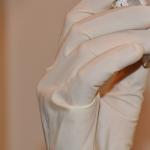The appearance and character of a person have their own data, according to which one can draw a physiological and moral portrait. The internal immune system of a person also has its own indicators, non-standard fluctuations of which lead to physical ailments, and a person begins to think about how to check immunity.
Immunity and its deficiency
But "nothing lasts forever under the moon", and a person's immunity can fail, which in medicine has the appropriate name - immunodeficiency, which can be different.
Types of immunodeficiency:
- Congenital - a person is born already with a genetic pathology, the symptoms of which are easily detected in the first half of a human life;
- Acquired immunodeficiency means that cardinal changes in immunity functions occurred directly during the life course after suffering serious illnesses such as diabetes mellitus, cirrhosis of the liver, AIDS, measles, cancerous tumors, rubella, tuberculosis and others.
Varieties of immune system deficiency, like all living things, require timely diagnosis and treatment. How can you tell if your home defense needs help too? There are two options for how to test your immunity: contact an immunologist to find out what tests you need to pass, or do an immunity test yourself at home.

Immunogram analysis
A comprehensive medical study of venous blood, which includes many examinations, is called an immunogram, the picture of which, in deciphering the results, will determine the state of the immune system. But not every person who doubts the stability of internal organs needs to rush to take a blood test for immunity.
When and to whom an immunogram is prescribed:
- the presence or suspicion of HIV infection;
- oncological disease or the risk of such (poor heredity), chemotherapy;
- after transplantation or removal of organs;
- with suspected immunodeficiency.
The last item includes:
- severe damage to the fungus of the oral cavity and other mucous membranes;
- frequent infectious diseases more than 6-7 times a year;
- causeless increase in temperature throughout the crescent;
- swollen lymph nodes without visible infection;
- purulent recurrent diseases of the mucous membranes and internal organs;
- constant pain in the joints, accompanied by causeless fatigue and complete loss of performance.
There is no single analysis in medicine to determine the state of the activity of the immune system. The immunogram is divided into a series of analyzes, the combined picture of which will subsequently make it possible to establish in which process of immunity the "breakdown" occurred.
Benefits of an immunogram:
- high diagnostic accuracy - up to 98%;
- painlessness and complete safety for a person;
- ease of research and high speed of obtaining results;
- automation and dynamics in the control of all stages of blood examination.
An expanded set of various tests allows you to accurately determine the degree of damage to immune cells and make an early diagnosis of diseases.

Classification (decoding) of antibodies in an immunogram
The immunogram parameters in the results vary in three variations: normal, depression (below normal) and excessive activity (above normal).
Immunoglobulin A- this antibody is the protection of all mucous membranes of the body. The desired rate is 0.9 - 4.5 g / l.
Immunoglobulin M includes antibodies directed against infections. The IgM norm ranges from 0.5 g / l to 3.5.
An upward deviation from the norm means the presence of some kind of infection or candidiasis, and can also be a sign of hepatitis, SLE, or arthritis. A decrease in IgM indicates radiation sickness or splenectomy.
Immunoglobulin G is responsible for passive immunity. The norm of IgG is 7 - 17 g / l.
An increase in IgG indicates possible progressive rheumatism or arthritis, and may also indicate the presence of HIV, multiple myeloma, systemic lupus erythematosus, or infectious mononucleosis. A reduced amount of IgG indicates possible poisoning with toluene or xylene, cirrhosis of the liver or radiation sickness.
The listed norms are considered the main ones in the immunogram, the rest of the indicators are too unpredictable and depend on the individuality of the immune system, so they will not be specified here to avoid misunderstandings. Only a specialist can recognize pathology in fluctuations from the norm. Alas, far from all people understand this, causing unreal myths and interpretations.
Determination of immunity status at home
This variation of the immunity test does not require financial costs and any preparation. It is enough to sit comfortably in a chair and sincerely answer the questions with short answers “yes” or “no”. Positive answers should be counted as 1 point and summarized at the end of the test.
Home immunogram:
We encourage you to take the test at home.
- Do you have at least one chronic disease?
- Do you have at least one of the bad habits: frequent drinking and smoking?
- Do you suffer from fungal diseases, skin rashes or frequent cold sores?
- Are you allergic to anything?
- Are you familiar with insomnia and recurring nightmares?
- Are your loved ones complaining about the snoring you make in your sleep?
- Do you have a mostly sedentary job?
- Do you like to play sports in your free time?
- Are you often irritable and lethargic for no reason?
- Is it easy to get you into a state of anger, but it takes you an hour to calm down?
- Do you include fruits and vegetables in the menu not every day, but from time to time?
- Can't imagine a day without sweets?
- Do you have problems with weight (overweight or excessive weight loss)?
- Do you need a long period of recovery after a cold?
- Do you often get a sore throat or flu (usually 4-5 times a year)?
If the test results do not exceed 1 point, then there is nothing to worry about, the immune troops of cells in orderly rows in full combat readiness repel strikes from outside.
With a result of 2 to 5 points, a person's immunity rings alarm bells with requests to review rest and nutrition regimes.
With a score above 5 points, the immune system is already emitting SOS signals with might and main, demanding, if not to visit a doctor, then take care of your health for sure.
Even if the home test showed a far from ideal level, this is not a reason for despair and hectic running around the doctors. An adult should understand that, first of all, this is a reason to find a couple of hours in his busy schedule for walking in the fresh air, this is a signal of an urgent change in diet in favor of tasty and healthy food, and, finally, this is a direct requirement of the body's immunity positivity, optimism and a smile!

3 common questions and real answer
Having in hand the results of various immunogram analyzes, how to find out the diagnosis, is it possible to be guided by the standards set out on the network
Searching for similar results on the World Wide Web based on supposedly "accurate" norms is a waste of time and possibly health. This is tantamount to how to study reviews of an immunogram on the Internet, and draw conclusions based on them. Only a professional immunologist is able to correctly link the result of the tests to the already identified symptoms.
I have a persistent skin rash, a dermatologist is powerless, and an appointment with an immunologist in our region can take months. Is it possible to independently pass all the tests for immunodeficiency?
It is possible, but not necessary. Firstly, you will still need to get to the doctor to decipher the tests. Secondly, you do not know exactly what tests you need, and this step will most likely be a waste of money, because the presence of a chronic skin rash requires, first of all, skin-allergic tests, and not an immunogram study. You should not make a global decision until the examination for immunity is prescribed by the appropriate doctor.
Immunogram tests are quite expensive, and prices vary widely depending on the status of the institution. Is it possible to donate blood in different laboratories?
Absolutely out of the question! The immunogram should be examined in the same medical institution. The results of various laboratories can be far from single, everything is interconnected: from the methodology of different tests to laboratory equipment.
If the prices of medical tests significantly exceed the family budget, you can use the second option for an immunity test: conduct an immunity test yourself.


